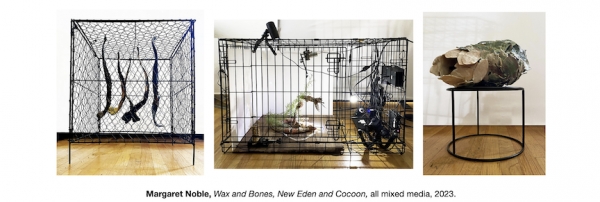| Event Title |
|
|
Dark Loops by Margaret Noble: A Multimedia Exhibition of Interwoven Realities, Artifice, and Ecocriticism
|
|
| Name |
San Diego Mesa College Art Gallery |
| Address |
FA103, 7250 Mesa College Drive |
| City |
San Diego |
| State |
CA |
| Zip |
92111 |
| Opening Hours |
Gallery Hours: M, T, W, TH 12 - 5 p.m. (Or by appointment.) Closed Fridays, Weekends & Holidays. For additional information, please visit: https://www.sdmesa.edu/art-gallery or call (619) 388-2829. |
|
|
|
| Fee |
FREE and OPEN TO THE PUBLIC. Event Parking in Lot # 1. Park in STAFF spaces ONLY. |
| Reception Date |
02-08-2024
|
| Dates |
Starts On 02-08-2024 Ends On 02-08-2024
|
| Opening Days |
Gallery Hours: M, T, W, TH 12 - 5 p.m. (Or by appointment.) Closed Fridays, Weekends & Holidays. For additional information, please visit: https://www.sdmesa.edu/art-gallery or call (619) 388-2829. |
|
| Event Description |
In the immersive exhibition "Dark Loops" artist Margaret Noble utilizes technology and artifice to explore the intricate connections between living and non-living entities in both our natural and man-made environments. Through a mix of sculptures, live-streaming videos, preserved insects, and technological components, the exhibition creates artificial ecosystems—miniature dioramas—within the gallery space. These installations blur the boundaries between the digital and physical worlds, encouraging contemplation on the complexities of our surroundings. Presented by the Mesa College Art Gallery, this exhibition will be on view from February 5 - 29, with the opening on Thursday, February 8 from 4 - 7 p.m. There will also be an artist talk on Wednesday, February 28, 5 – 7 pm.
|
| Images |
 |
|
| Event Title |
|
|
Dr. Bostjan Bugaric Lecture
|
|
| Name |
UC San Diego Visual Arts |
| Address |
9500 Gilman Dr. |
| City |
La Jolla |
| State |
CA |
| Zip |
92093 |
| Opening Hours |
1:30 - 3:00 p.m.
Feb. 8, 2024 |
|
|
|
| Fee |
|
| Reception Date |
00-00-0000
|
| Dates |
Starts On 02-08-2024 Ends On 02-08-2024
|
| Opening Days |
1:30 - 3:00 p.m.
Feb. 8, 2024 |
|
| Event Description |
Shared spaces are the future of our common life in the city. During the modernist era a term public space was used to define such places but the constitution of them were much more based on local economic and anthropocentric criteria, which allowed a strong touristification of public spaces and their transformation into the places of the production of private capital. As Marjetica Potrč states “the communities imagine the future city as a network of neighbourhoods and neither group was interested in public space, but they were all interested in shared space, community space,” it is important to follow some of the main paradigms of the changing world to therefore make a new agreement that is not human centred. Decolonizing methodologies can change the perception of ownership into caretaker. The first step is a definition of a new vocabulary based on trust and creating a ritual of transition within structuring new relationships in space. |
| Images |
 |
|







